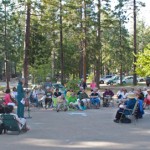Hoping for more sway in party choices
The California presidential primary is changing — again! Gov. Jerry Brown signed Senate Bill 568, which moves the California presidential primary to March. This is not the first time the Legislature has designated March as the time for the state to influence the selection of national presidential candidates.
The bill’s name, “The Prime Time Primary Act,” even suggests its intent. Beginning in January 2019, the state’s “presidential primary” will be held on the first Tuesday after the first Monday in March of any year that is evenly divisible by four. The bill also moves the statewide primaries to March in even-numbered years.
While Brown made no statement when he signed the bill, California’s Secretary of State Alex Padilla said, “The Golden State will no longer be relegated to last place in the presidential nominating process. California’s primary will officially be in prime time … The Prime Time Primary Act will help ensure that issues important to Californians are prioritized by presidential candidates from all political parties.”
This is not the first effort to inject California to the front of the presidential race. In 1996 and 2000, the state’s presidential primary was in March. By 2000, nine other states had already held their primary and 13 other states held their primary on the same day, according to the report from the Senate Committee on Elections and Constitutional Amendments.
In 2008, the California primary was in February for the presidential race but in June for state and local offices. Consequently, there were three statewide elections in 2008. By 2012, the presidential and state primaries returned to the first Tuesday after the first Monday in June.
Turnout in the presidential primaries peaked at more than 70 percent of registered voters in the two 1970s primaries. While it began to decline and was only 31 percent in the 2012 primary, it tends to be greater when neither major party has an incumbent on the ticket. The turnout in 2016 was nearly 48 percent. This was down from the nearly 58 percent in 2008 but greater than the turnouts in 2004 and 2012.
Opposition to the change, primarily the Peace and Freedom Party of California, emphasized the length and subsequent cost to the campaigns for state and Congressional offices from early March through early November. Further, to qualify for the March ballot, candidates would have to begin collecting signatures in September of the prior year.
Idyllwild’s State Senator Jeff Stone strongly supports the primary shift. “California has long been a spectator with primaries,” he lamented. “This puts California in play and will set the tone. We will be relevant.”










